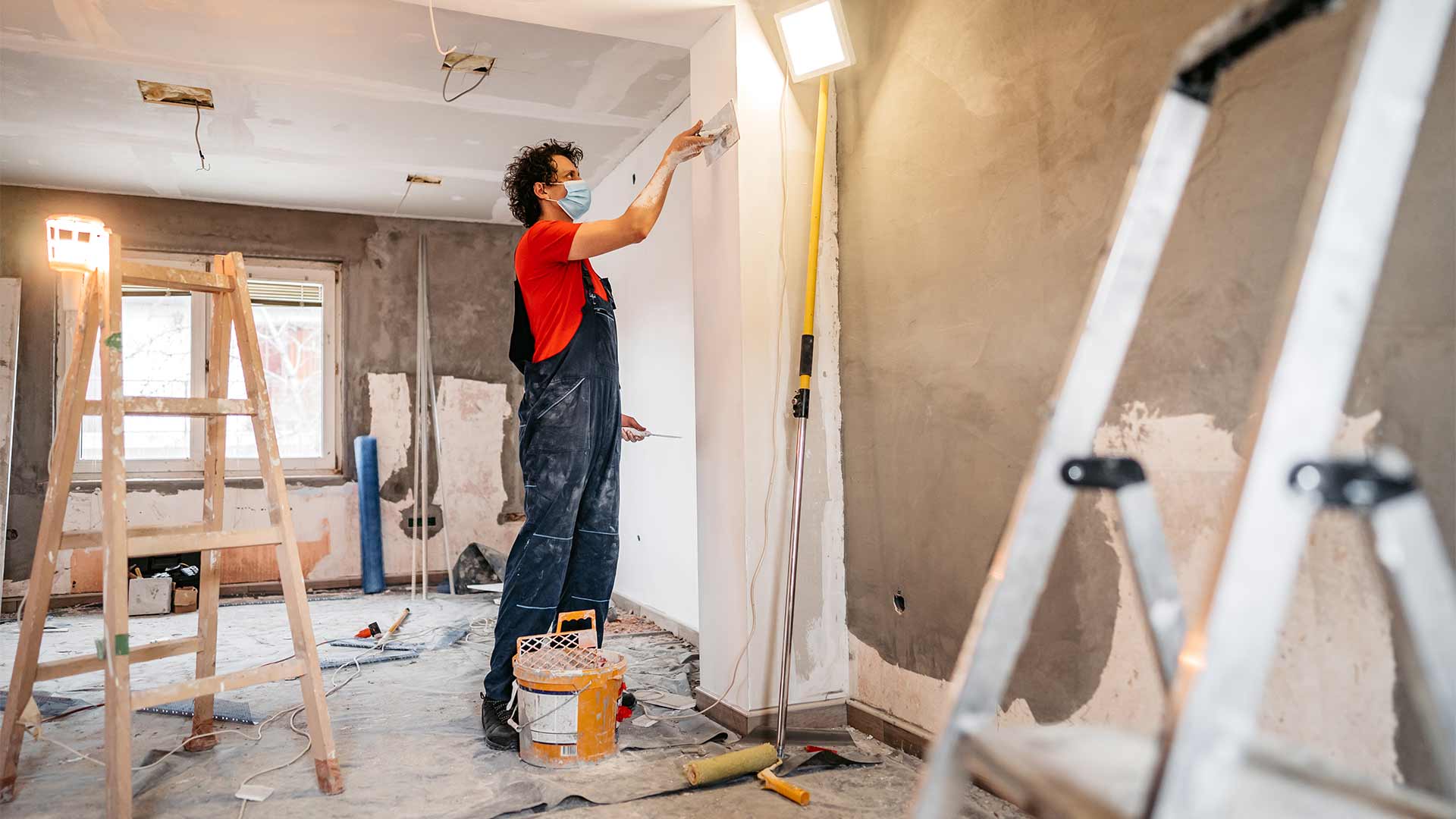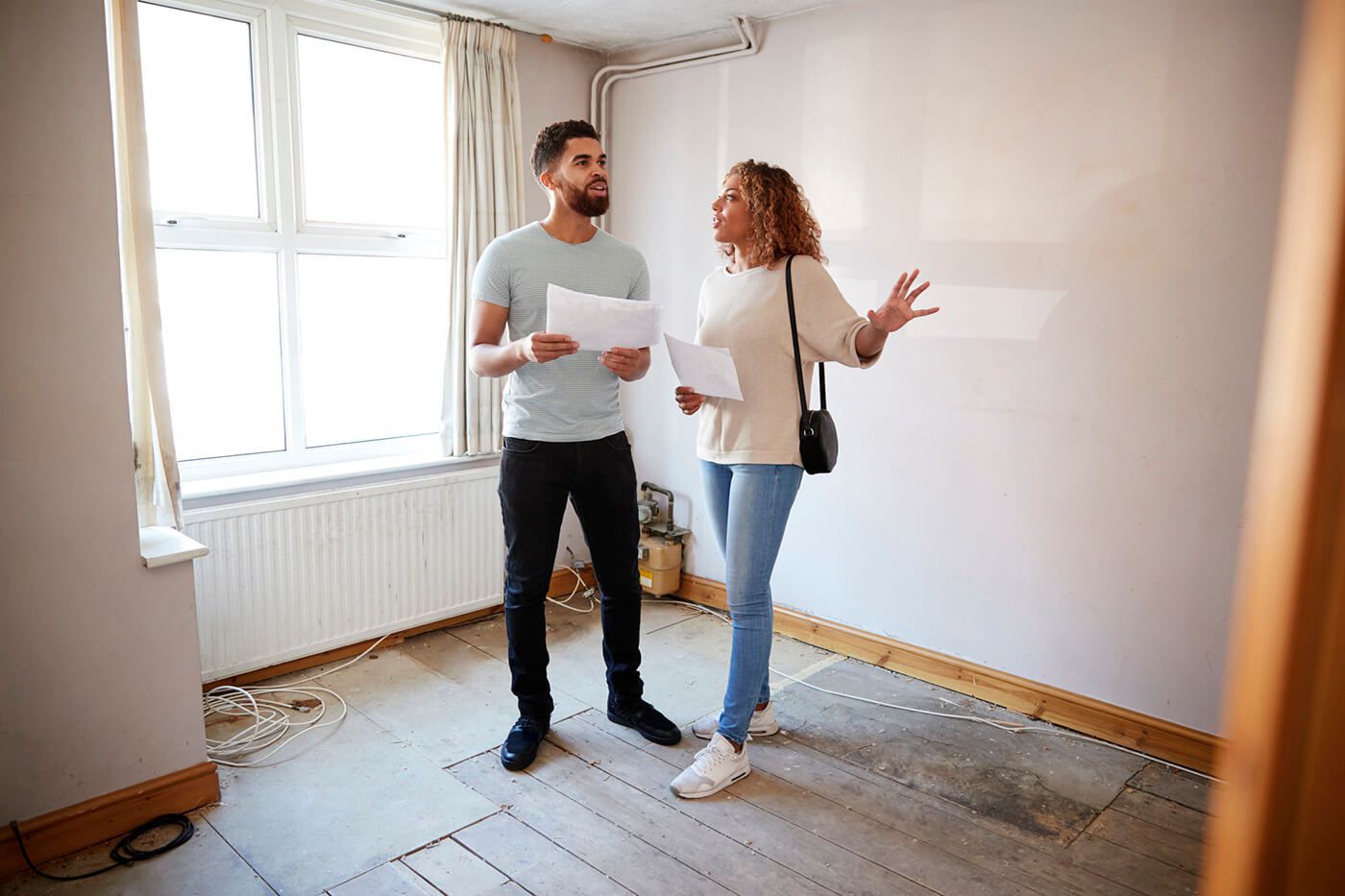

Finance
How To Buy A House With Bad Credit In Texas
Modified: February 21, 2024
Learn how to finance your home purchase in Texas, even with bad credit. Find out the best strategies and resources to buy a house with bad credit.
(Many of the links in this article redirect to a specific reviewed product. Your purchase of these products through affiliate links helps to generate commission for LiveWell, at no extra cost. Learn more)
Table of Contents
- Introduction
- Understanding Bad Credit
- The Importance of Credit Scores
- Assessing Your Financial Situation
- Researching Loan Options
- Government Assistance Programs
- Private Lenders and Seller Financing
- Improving Your Credit Score
- Saving for a Down Payment
- Working with a Real Estate Agent
- The Homebuying Process
- Negotiating the Purchase
- Closing the Deal
- Conclusion
Introduction
Buying a house is a significant milestone in life, but what happens if you have bad credit? While having a low credit score can make it more challenging to secure a mortgage loan, it does not necessarily mean that your dream of homeownership is out of reach. With the right knowledge, preparation, and a strategic approach, you can still buy a house even with bad credit, especially in the state of Texas.
Bad credit refers to a low credit score resulting from missed or late payments, high debt levels, or bankruptcy. Lenders use credit scores to assess a borrower’s creditworthiness and determine their willingness and ability to repay a loan. While having bad credit may make it more challenging to qualify for conventional mortgage loans, there are still options available in Texas.
One of the first steps in navigating the homebuying process with bad credit is understanding the importance of credit scores. Your credit score plays a significant role in determining the interest rate you will receive on a mortgage loan and the overall terms and conditions of the loan. Therefore, it is crucial to have a clear understanding of your credit score and what factors contribute to it.
Assessing your financial situation is another important step in buying a house with bad credit. Take the time to evaluate your income, expenses, and debts. This will give you an idea of your financial capabilities and help you determine how much you can afford to spend on a house. It’s essential to be realistic about your budget and ensure that you can comfortably make monthly mortgage payments.
Once you have a clear picture of your financial situation, it’s time to research loan options. While traditional lenders may be hesitant to approve a mortgage loan for someone with bad credit, there are government assistance programs and private lenders that specialize in serving borrowers with less than perfect credit. These alternate options can be a lifeline for those looking to buy a house in Texas with bad credit.
In addition to loan options, Texas offers government assistance programs designed to help low-income individuals and families become homeowners. These programs, such as the Texas Department of Housing and Community Affairs’ My First Texas Home Program, provide down payment assistance and favorable financing terms, making homeownership more accessible for those with bad credit.
Private lenders and seller financing are other avenues worth exploring when buying a house with bad credit in Texas. Some individuals or investors may be willing to offer financing directly, bypassing the traditional lending institutions and their strict credit score requirements. Seller financing allows the seller to act as the lender, providing financing directly to the buyer.
Improving your credit score is another important step in the homebuying journey. While it may take time, there are actions you can take to gradually improve your creditworthiness. Paying bills on time, reducing debt, and disputing any errors on your credit report can all contribute to raising your credit score.
Furthermore, saving for a down payment demonstrates financial responsibility and can help offset the impact of bad credit. While conventional loans typically require a down payment of 20%, there are options available that allow for a lower down payment or even down payment assistance programs.
Understanding Bad Credit
Before diving into the process of buying a house with bad credit, it’s essential to have a clear understanding of what bad credit entails. Bad credit is a term used to describe a low credit score, which can make it more challenging to obtain loans and credit cards at favorable terms.
Your credit score is a three-digit number that ranges from 300 to 850 and is calculated based on various factors, including your payment history, credit utilization, length of credit history, types of credit used, and new credit applications. A low credit score typically indicates a higher risk to lenders, as it suggests a history of late payments, high debt levels, or other financial mishaps.
Having bad credit can have significant consequences when it comes to buying a house. Mortgage lenders heavily rely on credit scores when evaluating loan applications. A low credit score can result in higher interest rates, stricter loan terms, or even rejection of the loan application altogether.
It’s worth noting that different lenders may have different criteria for what they consider as “bad” credit. While some lenders may be more lenient and willing to work with borrowers with lower credit scores, others may have stricter guidelines. It’s crucial to research and understand the specific credit score requirements of the lenders you plan to approach.
Bad credit can result from a variety of circumstances. It could be due to missed or late payments, excessive credit card debt, bankruptcy, foreclosure, or even a lack of credit history. Additionally, errors on your credit report can negatively impact your credit score, so it’s important to regularly review your credit report and dispute any inaccuracies.
If you find yourself with bad credit, it’s important not to lose hope. Building good credit takes time and effort, but it’s not an impossible task. By taking proactive steps to improve your creditworthiness, you can increase your chances of successfully buying a house, even with bad credit.
Understanding your credit score and the factors that contribute to it is the first step in improving your financial situation. Check your credit report regularly to identify any errors or inaccuracies. Addressing these issues can help boost your credit score and paint a more accurate picture of your creditworthiness.
Furthermore, it’s crucial to make all payments on time and in full. Payment history is one of the most significant components of your credit score, so establishing a track record of timely payments can have a positive impact on your creditworthiness. If you have outstanding debts, develop a plan to pay them down and reduce your overall debt-to-income ratio.
Finally, avoid taking on new credit or closing existing credit accounts unless necessary. Applying for new credit or closing old accounts can temporarily impact your credit score, so it’s best to be selective and strategic in your credit decisions.
While bad credit can present challenges, it’s important to remember that it doesn’t define your financial future. With patience, discipline, and a focused effort to improve your creditworthiness, you can overcome the obstacles and achieve your goal of buying a house.
The Importance of Credit Scores
Your credit score plays a vital role in the homebuying process, as it is a key factor that lenders consider when determining your eligibility for a mortgage loan and the terms they offer. Understanding the importance of credit scores can help you navigate the homebuying journey with confidence, even if you have bad credit.
Credit scores provide lenders with an assessment of your creditworthiness and likelihood of repaying a loan. The higher your credit score, the more favorable terms and interest rates you are likely to receive. Conversely, a lower credit score can lead to higher interest rates or even a loan denial.
When it comes to buying a house, your credit score can impact various aspects of the home loan process. First and foremost, it affects the interest rate you qualify for. A lower credit score often translates to higher interest rates, which means you’ll pay more in interest over the life of the loan.
Additionally, your credit score influences the type of loan you may be eligible for. Conventional loans typically require a higher credit score, while government-backed loans like FHA loans may be more accessible to borrowers with lower credit scores. Understanding which loan options are available to you based on your credit score can help you make informed decisions.
Credit scores also impact the overall affordability of a mortgage loan. Lenders not only consider the interest rate but also the loan-to-value ratio (LTV). A higher credit score can result in a lower LTV, meaning you may be able to borrow a higher percentage of the home’s value, thereby requiring a smaller down payment.
It’s important to note that credit scores are not solely based on your mortgage payment history. They take into account your entire credit history, including credit card payments, auto loans, student loans, and other debts. By making consistent, timely payments across all your financial obligations, you can improve your credit score over time.
In addition to the impact on loan terms, credit scores can also affect other aspects of the homebuying process. Landlords often check credit scores when evaluating rental applications, so having a lower credit score may impact your ability to secure a rental property. It can also affect insurance premiums, as some insurance providers consider credit scores when determining rates.
Even if you have bad credit, it’s important not to give up on your dream of homeownership. Understanding your credit score and the factors that contribute to it can empower you to take action and improve your creditworthiness. By paying bills on time, reducing debt, and disputing any errors on your credit report, you can gradually raise your credit score and increase your chances of securing a mortgage loan on favorable terms.
Remember, a credit score is not the sole determining factor when buying a house. Lenders also consider your income, employment history, and overall financial stability. Working with a knowledgeable mortgage lender who specializes in assisting borrowers with bad credit can help you explore additional options and assist you in finding a loan that suits your needs.
Assessing Your Financial Situation
Assessing your financial situation is a crucial step when buying a house, especially if you have bad credit. Taking the time to evaluate your income, expenses, and debts will help you determine how much you can afford to spend on a house and ensure you can comfortably make monthly mortgage payments.
Start by examining your income sources. Calculate your monthly take-home pay and consider any additional sources of income, such as rental properties or side jobs. This will give you a clear understanding of how much money you have available to allocate towards housing expenses.
Once you have a handle on your income, evaluate your monthly expenses. Consider both fixed expenses, such as rent, utilities, and car payments, and variable expenses like groceries, entertainment, and clothing. Understanding your monthly expenditure will help you determine how much you can afford to allocate towards a mortgage payment.
In addition to your regular expenses, factor in any outstanding debts you have. This includes credit card balances, student loans, auto loans, or any other ongoing financial obligations. By determining your debt-to-income ratio, you can assess your ability to manage additional debt from a mortgage loan.
Another aspect to consider is your credit utilization ratio. This refers to the percentage of your available credit that you are currently using. Lenders prefer to see a lower credit utilization ratio, as it indicates responsible credit management. If your credit cards are maxed out or close to their limits, it may be beneficial to pay down some debt before seeking a mortgage loan.
Keep in mind that buying a house involves more than just making monthly mortgage payments. You’ll also need to consider other homeownership costs, such as property taxes, insurance, maintenance, and potential HOA fees. Budgeting for these expenses will help you determine how much you can comfortably afford.
It’s crucial to be realistic about your financial capabilities and avoid stretching yourself too thin. While it may be tempting to max out your budget to purchase the ideal home, it’s important to consider future financial goals and unexpected expenses that may arise. Owning a home comes with additional costs, so make sure you have a buffer in your budget to account for these unexpected situations.
Once you have assessed your financial situation, you will have a clearer understanding of your budget and how much you can comfortably afford to spend on a house. This knowledge will guide your home search, allowing you to focus on properties within your price range and avoid wasting time on properties that are beyond your means.
Remember, even if you have bad credit, it’s possible to find a home that fits within your budget and meets your needs. By assessing your financial situation and being prudent with your spending, you can take steps towards homeownership and potentially improve your creditworthiness over time.
Researching Loan Options
When you have bad credit, researching loan options becomes even more critical in the homebuying process. While conventional loans from traditional lenders may be challenging to obtain with a low credit score, there are still viable options available that cater to borrowers with bad credit.
The first step in researching loan options is to familiarize yourself with the different types of loans available. Conventional loans, typically offered by banks and credit unions, have stricter credit score requirements. However, government-backed loans like Federal Housing Administration (FHA) loans are more accessible to borrowers with lower credit scores.
The FHA loan program provides lenders with insurance against default, enabling them to offer loans to borrowers with lower credit scores and smaller down payments. The minimum credit score required for an FHA loan can be as low as 500, making it an attractive option for those with bad credit.
In addition to FHA loans, other government-backed loan programs to explore include the U.S. Department of Agriculture’s (USDA) Rural Development loans and the U.S. Department of Veterans Affairs (VA) loans for eligible veterans and military personnel. These programs often have more lenient credit requirements and can offer favorable terms to qualified borrowers.
Private lenders specializing in bad credit loans are another option to consider. These lenders focus on working with borrowers who have less-than-perfect credit and may be more willing to approve a loan application despite a low credit score. However, it’s essential to proceed with caution when dealing with private lenders, as they may charge higher interest rates and fees.
When researching loan options, it’s crucial to evaluate the terms and conditions of each loan carefully. Look beyond the interest rate and consider factors such as the length of the loan, down payment requirements, closing costs, and any prepayment penalties. Understanding the full scope of the loan terms will help you make an informed decision.
In your research, don’t hesitate to reach out to multiple lenders to obtain loan quotes and compare their offerings. This will give you a better understanding of what is available to you and allow you to select the loan option that best suits your needs and financial situation.
Working with a reputable mortgage broker or loan officer experienced in dealing with borrowers with bad credit can also be beneficial. These professionals have access to a variety of loan options and can guide you through the loan application process, helping you select the best loan product for your specific circumstances.
Remember, even with bad credit, it is possible to find a loan that fits your needs. By exploring different loan options, comparing terms, and seeking guidance from professionals, you can increase your chances of securing a loan and moving closer to your goal of buying a house in Texas.
Government Assistance Programs
For individuals with bad credit who are looking to buy a house in Texas, government assistance programs can provide a valuable path to homeownership. These programs are designed to help low-income individuals and families overcome financial hurdles and achieve their goal of owning a home.
One such program is the My First Texas Home Program, offered by the Texas Department of Housing and Community Affairs. This program provides down payment assistance, favorable interest rates, and mortgage credit certificates to eligible first-time homebuyers. The down payment assistance can be a significant help for those with limited savings, making it easier to achieve the required down payment for a home purchase.
To qualify for the My First Texas Home Program, borrowers must meet certain income limits and credit requirements. While bad credit may not automatically disqualify you from participating in the program, it’s important to understand the specific credit score thresholds and work towards improving your creditworthiness.
Another government-backed option is the Federal Housing Administration (FHA) loan program. As mentioned earlier, FHA loans are accessible to borrowers with lower credit scores and offer more lenient qualifying requirements compared to conventional loans. The FHA insures the loans provided by approved lenders, making it safer for lenders to offer loans to borrowers with bad credit.
In addition to FHA loans, there are other government-backed loan programs available based on specific criteria and eligibility. The U.S. Department of Agriculture’s (USDA) Rural Development loans, for instance, offer financing options to low- and moderate-income buyers looking to purchase homes in rural areas. These loans may have less stringent credit score requirements and lower down payment thresholds.
Lastly, eligible veterans and military personnel can utilize the U.S. Department of Veterans Affairs (VA) loan program. VA loans often have more relaxed credit requirements and may not require a down payment or private mortgage insurance. This makes them an attractive option for veterans with bad credit who are looking to buy a house in Texas.
Researching and understanding these government assistance programs can help you determine if you qualify and identify the steps needed to take advantage of the available opportunities. In some cases, it may be necessary to meet with a loan officer or housing counselor who specializes in these programs to navigate the application process and ensure you are taking advantage of all the benefits offered.
Government assistance programs can be a significant help for individuals with bad credit who are determined to become homeowners. By taking advantage of the down payment assistance and favorable borrowing terms provided by these programs, you can overcome the barriers of bad credit and move closer to realizing your dream of owning a home in Texas.
Private Lenders and Seller Financing
When traditional lenders are hesitant to approve a mortgage loan due to bad credit, private lenders and seller financing can offer alternative options for buying a house in Texas. These avenues provide opportunities for borrowers with low credit scores to secure financing without solely relying on conventional lending institutions.
Private lenders specialize in working with borrowers who may have bad credit or unique financial situations. These lenders are often individuals or investors who are willing to provide financing directly to the buyer, bypassing the strict credit score requirements of traditional lenders. While private loans may come with higher interest rates and fees, they can still be a viable solution for those in need of immediate financing.
When considering working with a private lender, it’s important to conduct thorough research and due diligence. Verify the lender’s credibility, review their terms and conditions, and ensure clear communication about the loan terms and repayment schedule. Working with a reputable private lender can help you secure the financing you need while navigating the complexities of the homebuying process.
Seller financing is another option to explore when buying a house with bad credit. In this arrangement, the seller acts as the lender, providing financing directly to the buyer. This can be an attractive option for both parties, as it allows the buyer to secure financing despite bad credit and can potentially result in a faster sale for the seller.
With seller financing, the loan terms are negotiated between the buyer and the seller. This includes the interest rate, repayment schedule, and any other pertinent details. It’s essential to have a clear contract drafted to protect the interests of both parties and ensure a smooth transaction.
While private lenders and seller financing can provide opportunities for those with bad credit, it’s important to approach these options with caution. Carefully assess your ability to repay the loan and consider the potential risks and challenges associated with non-traditional financing. Working with a real estate attorney or financial advisor can help you navigate these arrangements and ensure all legal and financial aspects are properly addressed.
Moreover, don’t overlook the importance of improving your credit score and exploring other loan options in tandem with private lenders and seller financing. Taking steps to raise your creditworthiness can open up additional opportunities down the line and potentially allow you to refinance the loan at more favorable terms.
Private lenders and seller financing provide alternative pathways to homeownership for those with bad credit. By carefully considering the risks and benefits, conducting due diligence, and seeking professional guidance, you can explore these options as part of your strategy to buy a house in Texas.
Improving Your Credit Score
Having bad credit doesn’t mean you’re stuck with it forever. With time and effort, you can take steps to improve your credit score and increase your chances of obtaining a mortgage loan with favorable terms. Here are some strategies to help you improve your creditworthiness:
1. Pay bills on time: Payment history is a significant factor in determining your credit score. Make sure to pay all your bills, including credit card payments, loans, and utilities, on time. Consider setting up automatic payments or reminders to help you stay on track.
2. Reduce debt: High levels of debt can negatively impact your credit score. Focus on paying down existing debts, such as credit card balances or personal loans. Consider using the avalanche or snowball method to prioritize which debts to pay off first.
3. Dispute errors on your credit report: Regularly review your credit report and dispute any errors you find. Inaccurate information can lower your credit score unfairly. Contact the credit reporting agencies and provide supporting documentation to remove any incorrect information.
4. Maintain low credit utilization: Credit utilization refers to the percentage of your available credit that you are using. Aim to keep your credit utilization below 30% of your total available credit. Paying down credit card balances can help reduce your utilization ratio.
5. Avoid closing old credit accounts: Length of credit history is an important factor in your credit score. Avoid closing old credit card accounts, even if you’re not using them regularly. Keeping these accounts open demonstrates a longer credit history and can positively impact your score.
6. Open new credit accounts strategically: While it’s important to avoid taking on new debt unnecessarily, opening new credit accounts in a responsible manner can help improve your credit mix and increase your available credit. Consider opening a secured credit card or becoming an authorized user on someone else’s account.
7. Keep your credit inquiries to a minimum: Every time you apply for credit, a hard inquiry is made on your credit report, which can lower your score temporarily. Limit the number of credit applications you submit and only apply for credit when necessary.
Remember, improving your credit score takes time and persistence. It’s important to develop healthy financial habits, such as budgeting, saving, and responsible credit management. As you demonstrate positive financial behavior consistently, your credit score will gradually improve.
While working on improving your credit score, it’s essential to remain patient and realistic. It may take months or even years to see significant improvements. However, the effort is worth it, as a higher credit score can lead to better loan options, lower interest rates, and reduced borrowing costs.
Consulting with a credit counselor or financial advisor can provide you with personalized guidance and strategies to improve your credit. They can help you create a plan tailored to your specific financial situation and goals.
By actively working towards improving your credit score, you will not only increase your chances of obtaining a mortgage loan but also enhance your overall financial well-being in the long run.
Saving for a Down Payment
When buying a house, saving for a down payment is a crucial step in the process. While conventional loans typically require a down payment of 20%, there are options available that allow for a lower down payment or even down payment assistance programs. Here are some tips to help you save for a down payment, even if you have bad credit:
1. Set a savings goal: Determine how much you need to save for your desired down payment. This will give you a target to work towards and help you stay motivated. Consider using an online savings calculator to track your progress and determine how much you need to save each month.
2. Create a budget: Review your income and expenses to identify areas where you can cut back and save more. Look for ways to reduce discretionary spending, such as eating out less or cutting back on entertainment expenses. By living within your means and prioritizing savings, you can accelerate your down payment savings.
3. Automate your savings: Set up automatic transfers from your paycheck or checking account to a separate savings account dedicated to your down payment. By automating the process, you ensure that savings are consistently being contributed without the temptation to spend the money elsewhere.
4. Consider a side hustle: If your regular income is not sufficient to save for a down payment, consider taking on a part-time job or a side hustle to generate additional income. Use the extra money earned specifically for your down payment savings.
5. Reduce expenses: Look for opportunities to cut back on unnecessary expenses. Consider negotiating lower rates for services such as cable, internet, or insurance. Shop around for better deals on items like car insurance or cell phone plans. Every dollar saved can contribute to your down payment fund.
6. Explore down payment assistance programs: Research down payment assistance programs available in your area. These programs provide grants or low-interest loans to help buyers with low or moderate income levels afford a down payment. Check with local housing agencies or nonprofit organizations to see if you qualify for any assistance.
7. Save windfalls and tax refunds: When unexpected cash windfalls come your way, such as work bonuses or tax refunds, resist the temptation to spend them. Instead, use these funds to boost your down payment savings. Consider it an extra boost towards achieving your homeownership goal.
8. Consider alternative loan options: Explore loan programs that offer lower down payment requirements. For example, FHA loans typically require a down payment as low as 3.5% of the purchase price. While these options may come with additional requirements or mortgage insurance, they can help you get into a home sooner with a smaller down payment.
Remember, saving for a down payment takes time and discipline. It’s important to stay focused on your goal and make regular contributions to your savings account. By prioritizing saving and utilizing available resources, you can gradually accumulate the necessary funds to achieve your homeownership dreams, even with bad credit.
Working with a Real Estate Agent
When buying a house, especially with bad credit, working with a professional real estate agent can be invaluable. A knowledgeable and experienced agent can guide you through the homebuying process, help you navigate challenges that may arise, and advocate for your best interests. Here are some reasons why working with a real estate agent is beneficial:
1. Expertise and Market Knowledge: Real estate agents have a deep understanding of the local housing market. They can provide valuable insights and guidance on neighborhoods, property values, and market trends. This knowledge is essential when making informed decisions and finding the right home within your budget.
2. Access to Listings: Real estate agents have access to a wide range of listings through Multiple Listing Services (MLS). They can set up customized searches based on your criteria, including price range, location, and desired features. This saves you time and ensures that you are aware of all available properties that meet your needs.
3. Negotiation Skills: Negotiating the purchase of a home requires skill and experience. A real estate agent acts as a mediator between you and the seller, helping to negotiate the best terms and price for your purchase. They have the expertise and knowledge to navigate negotiations effectively and protect your interests.
4. Network of Professionals: Real estate agents work closely with other professionals involved in the homebuying process, such as lenders, inspectors, appraisers, and attorneys. They can provide recommendations and coordinate these services, ensuring a smooth and efficient transaction.
5. Assistance with Paperwork: Buying a house involves extensive paperwork and contracts. Real estate agents are familiar with the necessary documents and can guide you through the paperwork with ease, ensuring that everything is completed correctly and in a timely manner.
6. Guidance on Financing Options: Real estate agents can help connect you with reputable lenders who specialize in working with buyers with bad credit. They can provide guidance on financing options and assist you in finding the loan that best fits your needs and financial situation.
7. Peace of Mind: Perhaps most importantly, working with a real estate agent provides peace of mind throughout the homebuying process. They handle the details, answer your questions, and provide support and guidance every step of the way. This allows you to focus on finding the right home and making informed decisions.
When choosing a real estate agent, look for someone with experience in your target area and who has a track record of working with buyers with bad credit. Interview multiple agents, ask for references, and select someone who you feel comfortable communicating with and who understands your specific needs and goals.
Ultimately, having a professional real estate agent by your side can make a significant difference in your homebuying journey. They can streamline the process, provide expert advice, and increase your chances of finding and securing the right home, even with bad credit.
The Homebuying Process
The homebuying process can feel overwhelming, but understanding the different steps involved can help you navigate the journey with confidence, even with bad credit. Here is an overview of the homebuying process:
1. Determine Your Needs and Priorities: Start by clarifying your housing needs and priorities. Consider factors such as location, size, amenities, and proximity to schools or work. Having a clear idea of what you’re looking for will guide your search.
2. Get Preapproved for a Mortgage: Before you begin your home search, it’s important to get preapproved for a mortgage. This involves submitting your financial information to a lender who will evaluate your creditworthiness and determine the loan amount for which you qualify. Preapproval gives you a clear understanding of your budget and strengthens your position as a serious buyer.
3. Start Your Home Search: With your budget and priorities in mind, begin your search for homes that meet your criteria. Utilize online listings, work with a real estate agent, and visit open houses to get a sense of available properties in your desired area.
4. Make an Offer: When you find a home that meets your needs, work with your real estate agent to prepare a competitive offer. Be mindful of the condition of the home and any repairs or updates that may be needed. Your agent will guide you through the negotiation process and help you reach an agreement with the seller.
5. Secure Financing: Once your offer is accepted, it’s time to finalize your financing. Work closely with your lender to provide all necessary documentation and complete the mortgage application process. Be prepared to provide additional information or documentation if requested by the lender.
6. Conduct Inspections: It’s important to have a professional home inspection to assess the condition of the property. The inspector will identify any potential issues or areas of concern that may impact your decision to move forward with the purchase. Based on the inspection results, you may negotiate repairs or adjustments with the seller.
7. Complete Closing Requirements: As the closing date approaches, work with your real estate agent and lender to ensure all closing requirements are met. This includes conducting a title search, obtaining homeowner’s insurance, and completing any necessary final paperwork.
8. Closing the Deal: On the closing day, formally transfer ownership of the property. You’ll review and sign various documents, including the mortgage agreement and the deed. Pay any closing costs, which may include fees for the loan, title search, appraisal, and attorney services. Once all the paperwork is completed, you’ll receive the keys to your new home.
Throughout the homebuying process, it’s important to maintain open communication with your real estate agent and lender. Be proactive in understanding and fulfilling your responsibilities, and don’t hesitate to ask questions or seek clarification when needed.
Remember, the homebuying process is a journey, and it may take time to find the right home and secure financing, especially with bad credit. Stay patient, remain diligent in your search, and be open to exploring different options along the way. With perseverance and the right support, you can achieve your goal of homeownership.
Negotiating the Purchase
Negotiating the purchase of a home is a crucial step in the homebuying process, especially if you have bad credit. Here are some tips to help you navigate the negotiation process and secure a favorable deal:
1. Research and Understand the Market: Before entering negotiations, research the local real estate market. Understand the recent sales prices of comparable properties in the area. This knowledge will give you a realistic idea of the property’s value and help you make an informed offer.
2. Work with a Real Estate Agent: A real estate agent can be an invaluable asset during negotiations. They have experience in negotiating deals and can advocate for your interests. Your agent will help you determine a competitive offer price and guide you through the negotiation process.
3. Consider the Seller’s Perspective: Understanding the seller’s motivations can provide insight during negotiations. Are they in a rush to sell? Are there any factors, such as repairs or relocation, that may influence their willingness to negotiate? By considering these factors, you can tailor your negotiation strategy accordingly.
4. Price Isn’t Everything: Negotiating the purchase isn’t just about the price. Consider other terms of the offer, such as contingencies, closing dates, or repairs. Sometimes, offering flexibility in these areas can make your offer more appealing to the seller, even if your price is slightly lower.
5. Be Reasonable and Flexible: While it’s important to negotiate for a fair deal, it’s equally crucial to be reasonable and flexible. Stubbornness or unrealistic demands can hinder the negotiation process. Work with your real estate agent to determine what aspects of the deal are non-negotiable, and be open to finding common ground with the seller.
6. Request Repairs or Credits: If the home inspection reveals issues that need attention, you can negotiate for repairs or credits to address them. Determine which repairs are essential and prioritize those in your negotiations. Be prepared to provide estimates and documentation to support your requests.
7. Don’t Disclose Financial Constraints: When negotiating, it’s essential to keep any financial constraints or limitations, such as bad credit, to yourself. Revealing your financial situation may weaken your bargaining position. Focus on the property’s value, condition, and comparable sales when making your case.
8. Stay Emotionally Detached: Buying a home is an emotional process, but it’s important to remain emotionally detached during negotiations. Your real estate agent can provide a professional perspective and keep negotiations focused on the facts and numbers. Emotions can cloud judgment and hinder effective negotiation strategies.
9. Have a Backup Plan: Despite your best efforts, negotiations may not always work out. Have a backup plan in mind in case the deal falls through. Keep searching for other potential properties and continue working with your real estate agent to explore other options.
Remember, negotiation is a give-and-take process. Be prepared for some back and forth, and be patient during the negotiation process. By staying informed, reasonable, and flexible, you can increase your chances of securing a successful negotiation and obtaining the home you desire, even with bad credit.
Closing the Deal
The closing is the final step in the homebuying process, where ownership is officially transferred from the seller to the buyer. Closing the deal involves several important tasks and paperwork that need to be completed. Here’s what you can expect during the closing process:
1. Review the Closing Disclosure: Prior to closing, you will receive a Closing Disclosure, which outlines the final details of your loan, including the loan amount, interest rate, closing costs, and any other fees. Review the document carefully and compare it to your Loan Estimate to ensure accuracy.
2. Schedule the Closing: Work with your real estate agent, lender, and closing agent to coordinate a date and time for the closing. The closing typically takes place at a title company, attorney’s office, or escrow company, with all parties involved present.
3. Conduct a Final Walk-Through: Before the closing, schedule a final walk-through of the property to ensure it is in the agreed-upon condition and any repairs or requirements have been met. This is your last chance to confirm that everything is as expected before signing the final documents.
4. Sign the Necessary Documents: During the closing, you will sign numerous legal documents, including the mortgage note, deed of trust or mortgage, and other loan-related paperwork. Your real estate agent or closing agent will guide you through the documents and explain their significance.
5. Pay Closing Costs: Prior to or at the closing, you will need to pay the closing costs. These costs include fees for the loan, title search, appraisal, attorney services, and any other expenses associated with the closing. Review the Closing Disclosure to understand the total amount due.
6. Review Homeowners Insurance: Before closing, you will need to secure homeowners insurance and provide proof of coverage to the lender. This insurance protects both you and the lender in case of damages or loss to the property. Make sure you have the necessary insurance in place before closing.
7. Transfer Funds: If you are required to bring funds to closing, ensure that you have the necessary funds available. Coordinate with your lender or closing agent on the exact amount and the acceptable forms of payment, such as a cashier’s check or wire transfer.
8. Complete the Title Transfer: The closing agent will facilitate the transfer of the title from the seller to the buyer. This includes recording the deed with the appropriate government agency and ensuring that all legal requirements are met for a valid transfer of ownership.
9. Receive the Keys: Once all the paperwork is signed, funds are transferred, and the title is officially transferred, you will receive the keys to your new home. Congratulations, you are now a homeowner!
Remember, the closing process can be complex, so it is essential to review all documents and ask questions if something is unclear. Work closely with your real estate agent, lender, and closing agent to ensure a smooth and successful closing. By carefully completing all necessary tasks, you can confidently walk away from the closing with the keys to your new home.
Conclusion
Buying a house with bad credit may come with its challenges, but it is certainly not impossible. By understanding the intricacies of the homebuying process, researching loan options, and working with professionals who specialize in assisting buyers with bad credit, you can make your dream of homeownership a reality.
Throughout the journey, remember to focus on improving your credit score, as this will not only increase your chances of securing favorable loan terms but also set you up for better financial opportunities in the future. Take steps to pay bills on time, reduce debt, and dispute any errors on your credit report.
In addition to focusing on your credit, diligently save for a down payment and explore government assistance programs and alternative financing options. These resources can provide valuable support and potentially help you overcome the barriers of bad credit.
Working with a real estate agent who understands your unique situation can be a game-changer. They will guide you through the homebuying process, provide expert advice, and negotiate on your behalf to ensure the best possible outcome.
Lastly, as you approach the closing of the deal, pay attention to the details, review all documents carefully, and communicate openly with your real estate agent and closing agent. Closing represents the culmination of your efforts and the beginning of your homeownership journey.
While bad credit can present challenges, it should not deter you from pursuing your goal of owning a home. With determination, patience, and the right strategies, you can overcome the obstacles and find success in your homebuying journey.
Remember, owning a home is a significant accomplishment, providing stability, security, and a place to call your own. By taking the necessary steps and using the resources available to you, you can turn your homeownership aspirations into a reality, even with bad credit.














